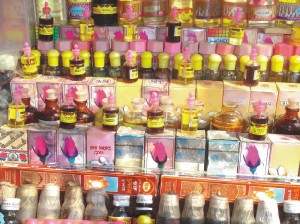Attar: The fading fragrance
Afsar Ahmed
It is the essence of a bygone era that arises from the narrow lanes and narrower by-lanes. Preserved in these streets once frequented by the royalty is the fragrance of attar--the perfumes of kings and queens, which hark back to the fragrant era of tammadun and tehzeeb.Attar--the Urdu transcript of which means 'divine fragrance' is originally derived from the Arabic word Itr, meaning perfume. The celestial cologne has, so long, maintained its antiquated existence in the Nawabi era of Dhaka, although the availability is now restricted only to a handful of shops in the Old City precincts and near the Baitul Mokarram Mosque. According to the Holy Quran, Muslims cannot use any other perfumes but attar because of the alcoholic content in most of them, which is a religious prohibition. And that's why there are still people who go for the exotic scent during religious occasions like Eid and Jummabar. What distinguishes attars from western perfumes is that they are oil-based and are made totally from organic materials. Old texts mention that the floral group, primarily used for attar manufacture, was rose, beli, jasmine, champa, molesari and tuberose along with roots like ginger and others. Sandal, cinnamon and aloe bark were also used. Heavy odours like musk and myrrh were also used with khus. The traditional technique of attar-making has remained unchanged since the time of the Mughals. The process is slow, labour intensive and veiled in secrecy. There is a haze of fragrant mystery that surrounds almost every aspect of attar making. 'It is a craft that has a rich history and mythology of its own,' says Abbasuddin, an aged attar seller near Baitul Mokarram, on the apocryphal story of Mughal Queen Noor Jehan discovering the exotic Rose Attar. The story goes that Noor Jehan went for a morning bath and was delighted with the fragrance of the oily layer on the water which had been left overnight to keep it cool. When distilled, it turned out to be her favourite rose perfume. There are hundreds of varieties of attar around the city. The most expensive brand Havoc comes from France and costs Tk. 30,000 per ounce. Kasturi, a musk of the deer navel, costs Tk. 800 per ounce while the Magnet costs Tk. 600 per ounce. However, the most popular one is the Swiss-made Jannat-ul-Ferdous--selling at Tk. 150 per vial of 10 grams. There are a lot more in the cheaper range, for the poor and middle class consumers. Beli, Kacha Beli, Henna, Mushkamber, Vickey, Gul-e-Laila, Darbar range from Tk. 10 to Tk. 60 per ounce. 'The imported perfume brands have overrun us and our business, weaning away our clientele,' laments Jamil Ahmed, who runs Kannauj Perfumery Attar House--one of the oldest and largest attar outlets in the city at Mitford Road. Bottled in attractive cut glasses of various shapes and sizes known as drums or shishis, a dash of musk is added to the attar to give it an international touch, Jamil informs. He rues the tendency of the younger generation to denigrate attar as outdated. 'It's a pity that the youth do not take pride in their heritage and history any more,' he says. Recalling the erstwhile flourishing attar market, Jamil who is the third generation to inherit the business started by his ancestors, says, 'Previously, we used to have at least 100 people coming and checking out our ranges of exotic and exquisite perfumes. Today, however, we have hardly a dozen people even though prices have been drastically reduced.' There is a polarity of opinion about attar. Says North South University student Abeer, 'Who would like to be labelled as out-fashioned by using attar these days? I would rather use an expensive Hugo Boss or a moderately priced Axe to be in tune with the times.' In total contrast, counters Mamun, 'I am seriously contemplating to switch over to attar from the usual deodorants and perfumes.' The fact is that the enticing fragrance of yesteryears is slowly but surely being pushed into oblivion. 'The loss will mean parting with our own heritage. What is more distressing is that nothing can be done to undo the decline in attar's popularity,' says Hazi Ibrahim Khan, an attar lover. Today as Bangladesh finds its new identity in the twenty-first century, its urban society is now much more in touch with foreign products and foreign lifestyles. Buying habits are changing. Western perfumes are now freely available over the counter. The traditional attar is suddenly an endangered species except on special days like Eid and Jummabar.
|

Stacks of various kinds of attar bottles ready for sales on the eve of Eid |